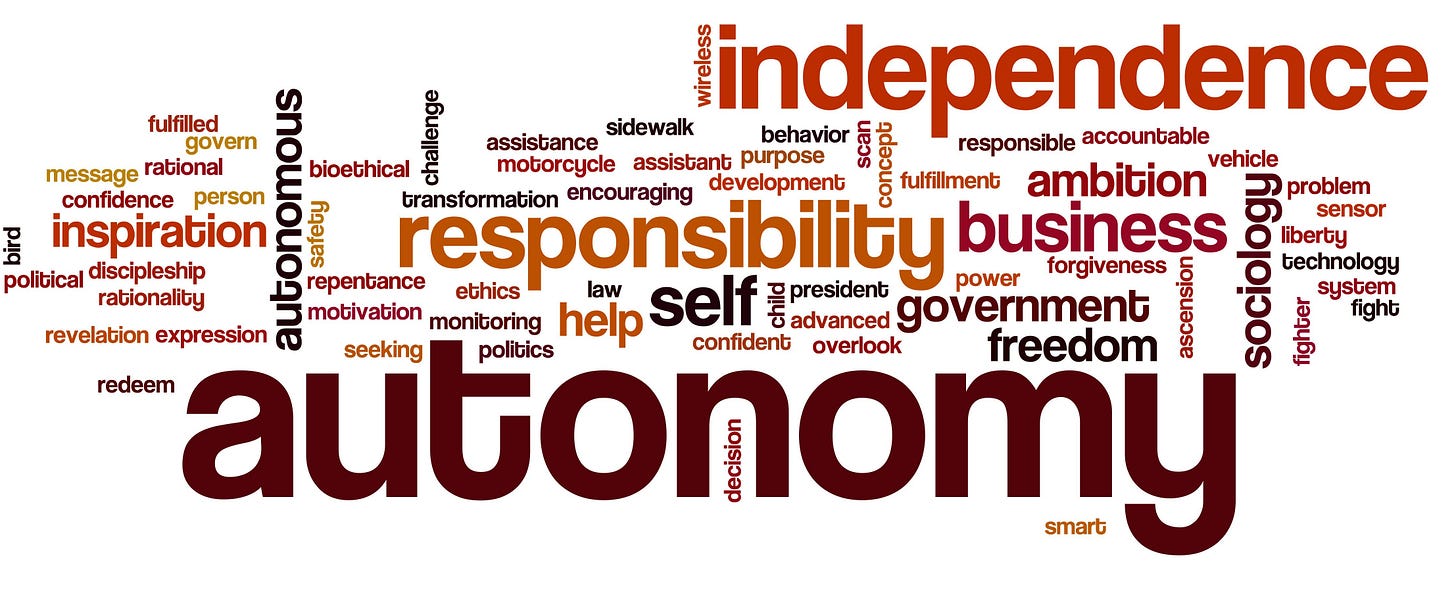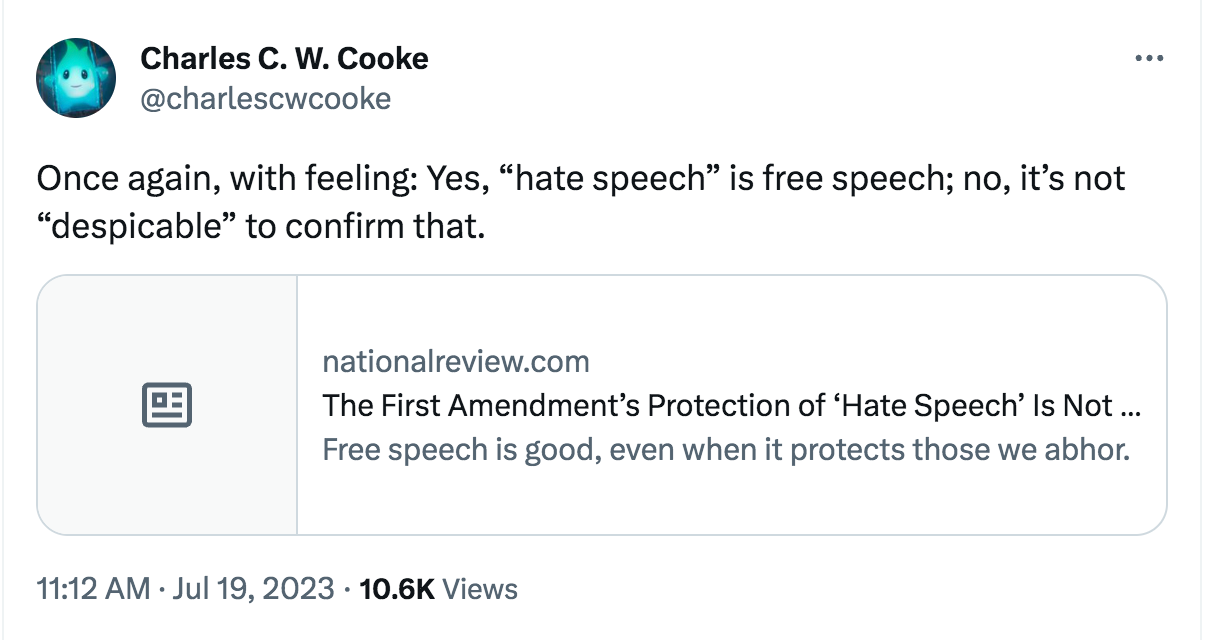E-Pluribus | July 19, 2023
Journalism for the win; individualism's place in a free society; and Congress shall make *some* laws abridging the freedom of speech?
A round-up of the latest and best writing and musings on the rise of illiberalism in the public discourse:
Bari Weiss: When Ideology Corrupts Medicine—and How One Reporter Exposed it
The BBC’s exposé on the British Tavistock child gender identity clinic run by the country’s National Health Service has had an enormous impact on the overall direction and tenor of coverage on transgender issues, particularly involving children. At The Free Press, Bari Weiss interviews Hannah Barnes about her reporting and her new book on the story.
Bari Weiss: Hannah, you’ve had a really long career at the BBC. You’re an award-winning producer for their flagship news and current affairs program, Newsnight, which is a bit like 60 Minutes in terms of prestige. For the past decade and a half, you’ve been reporting and editing some of the BBC’s most respected documentaries and shows. But for whatever reason, you decided to step into the most controversial topic in the world. Why did you decide to do that?
Hannah Barnes: Well, I didn’t realize at the time it was the most controversial topic in the world. I think I stepped into it because I thought there was something going on there, and it’s the job of a journalist to shine a light on something that’s important but that we’re not hearing much about. This is about children receiving off-label drugs and doing something potentially major to their bodies. For some children that will obviously be the right path, but when we started looking into it, we found that there were ten clinicians—a quarter of the staff—at the Gender Identity Development Service (or GIDS) that had expressed quite serious concerns at this point. Yet, the British media weren’t giving it the attention it deserved. I went into it thinking I don’t know if what they’re saying is true, but it’s really worth looking at because that’s the kind of thing we should be doing as journalists.
BW: And as you’re looking through the documents, the internal emails, these unpublished reports, what was your light bulb moment, if there was one? When did you realize that this wasn’t just a few examples of treatment gone awry but a system-wide problem?
HB: So, this is a healthcare story. No one is questioning someone’s identity or that trans people should have anything other than happy lives free of harassment. It wasn’t about identity for us ever. It’s about “Are vulnerable young people being given the best and safest care possible in each and every case?” But I think I realized that there was something quite serious here when I saw the transcripts of some of the interviews that took place as part of an official review of the clinic that was published early in 2019. The review said they had investigated, and none of the concerns that had been raised and leaked to the media were of immediate safeguarding concerns. And then you read what a sizable number of clinicians told the medical director on record, and it’s awful. Some of them had serious child protection concerns. There were clinicians saying these are some of the most vulnerable children they’d ever worked with and they are in really desperate situations. In some cases they’re being referred for a medical intervention after an hour. It’s quite clear from those documents just how worried they are, and it’s just impossible to see those concerns as coming from a place of transphobia. It’s just not credible. These are professional people who’ve dedicated their working lives to helping young people, and what they were saying boils down to: this is not good clinical practice. This isn’t how we’ve ever practiced in other places we’ve worked. Somehow, because this is a gender clinic, the same questions that we would ask normally were not welcome.
Read the whole thing.
Emily Chamlee-Wright: Humane Liberalism Begins with Autonomy
At Persuasion, in the context of medically-assisted suicide, Emily Chamlee-Wright writes about “gifts-based liberalism” and its contrast with “autonomy liberalism” as represented by the New York Times’s David Brooks. A free society must strike the right balance between individual freedom and the actions of individuals on the overall society. Chamlee-Wright suggests that leaning towards individual autonomy is a “frustratingly imperfect solution,” but that it’s the least bad alternative.
I have always appreciated David Brooks’ ability to put serious ideas to work in understanding our times and our place within it. His recent Atlantic essay, which recounts how swiftly Canada’s medical assistance in dying (MAiD) program degraded from a dignity-preserving last resort to a utilitarian transaction, is no exception.
Brooks’ case against MAiD is compelling. In 2016, Canada legalized assisted suicide for terminally-ill patients, those in an advanced and irreversible state of decline experiencing unbearable pain and suffering. But by 2021, the requirement that natural death must be “reasonably foreseeable” was dropped, and applications spiked. Most troubling were those from people with disabilities but no terminal illness. In 2024, the program’s eligibility will expand further to include those who suffer from mental health problems, but no other physical illness.
[ . . . ]
But Brooks’ essay isn’t really about the debate over assisted suicide. Rather, the real subject is what sort of liberal society we want to live in. In Brooks’ telling, philosophical liberalism, built upon a foundation of individual liberty, is a very good idea. But if taken too far—as he argues happened in the case of MaiD—this very good idea can land us in a hellscape in which we destroy community and any sense of obligation to care for one another. We need a better alternative.
[ . . . ]
[B]rooks, the philosophical liberal, worries on behalf of liberal society. When liberal individualism is taken too far, he argues, we become self-absorbed, neglect our neighbors, and abandon the most vulnerable among us. He fears that this is what tempts people on both the center left and center right to reject the liberal order in favor of populism, nationalism, and authoritarianism. To guard against the rising tide of illiberalism, Brooks’ project is to recover a “better, more humane liberalism.” And this means setting aside what he calls “autonomy liberalism” in favor of “gifts-based liberalism.”
Autonomy liberalism, he explains, is grounded in the concept of self-ownership. It is based on the conviction that says, “I am a piece of property. [...] My life is a project that I am creating, and nobody else has the right to tell me how to build or dispose of my one and only life.” And it’s this emphasis on individual sovereignty, Brooks warns, that “inevitably erodes the bonds between people.” Individualism cuts us off from the families, friends, and communities that shape us and dissolves the relational obligations that bind us to one another. The world of autonomy liberalism is one in which every social interaction becomes a utilitarian transaction; a place where nothing is sacred.
Gifts-based liberalism, on the other hand, rests upon the idea that every human being—by virtue of the fact that we are alive—has been given a gift of inestimable value. Our primary moral obligation is to use that gift well. The humane liberalism that Brooks seeks is one in which we recognize that we are not merely isolated individuals and property owners. We are citizens, neighbors, and family members embedded within a web of social ties, thick and thin. Those ties come with obligations—but as Brooks notes, these obligations often “turn out to be the sources of our greatest joy.”
Read it all.
Kenin M. Spivak: Ending Free Speech
A preliminary injunction handed down by Judge Terry Doughty on July 4 in the Missouri v. Biden lawsuit involving governmental censorship pressure on social media companies has provoked strong reactions on both sides of the issue. Kenin Spivak at the Claremont Institute’s The American Mind argues that nothing less than the future of the American Experiment is at stake.
Until recently, liberals and conservatives alike were aligned in an unflinching commitment to unrestricted rights of free speech. Less than 50 year ago, liberals coalesced to defend the right of the National Socialist Party of America to march through Skokie, Illinois. When it invalidated statutes that could bar the Nazi march, the Seventh Circuit Court of Appeals gave short shrift to the district court’s opinion that Nazi philosophy was completely unacceptable to civilized society, writing, “But there can be no legitimate start down such a road. Under the First Amendment there is no such thing as a false idea. However pernicious an opinion may seem, we depend for its correction not on the conscience of judges and juries but on the competition of other ideas.”
The Washington Post’s news report of Doughty’s injunction crystalizes the metamorphosis among the liberal elite. It signaled Doughty’s vulgar provenance by repeatedly observing that he had been nominated by Donald Trump, starting with its headline and sub-head: “Judge blocks U.S. officials from tech contacts in First Amendment case. The Trump-appointed judge’s move could upend years of efforts to enhance coordination between the government and social media companies.” The article falsely claimed that “an extraordinary preliminary injunction… could have profound effects on the First Amendment,” and correctly observed that “The Donald Trump-appointed judge’s move could undo years of efforts to enhance coordination between the government and social media companies.” It barely mentioned the exceptions in the injunction, the undisputed evidence, or the breadth of the censorship program.
The New York Times falsely characterized the Government’s position as an effort to preserve a hundred years of Supreme Court jurisprudence on the First Amendment, and a Republican effort to “upend decades of legal norms that have governed speech online.” It reported an outright lie as a fact substantiated by experts: “The defendants, the social media companies and experts who study disinformation have argued that there is no evidence of a systematic effort by the government to censor individuals in violation of the First Amendment.” The article never mentioned the voluminous uncontested facts of Government coercion and control, nor its admitted effort to use private organizations to mask its knowing violations.
Read it all here.
Around Twitter
Here’s a reminder via Zaid Jilani that often there’s more to a story than first meets the eye. A Georgia teacher fired over reading a book? Well, not quite:
Leighton Woodhouse and his colleagues at Public report on the deception practiced by some public health officials early in the pandemic regarding the possibility of a lab leak in Wuhan:
And finally, Charles C.W. Cooke calls out the Arizona Democrats, who called standing up for free speech “despicable”:










